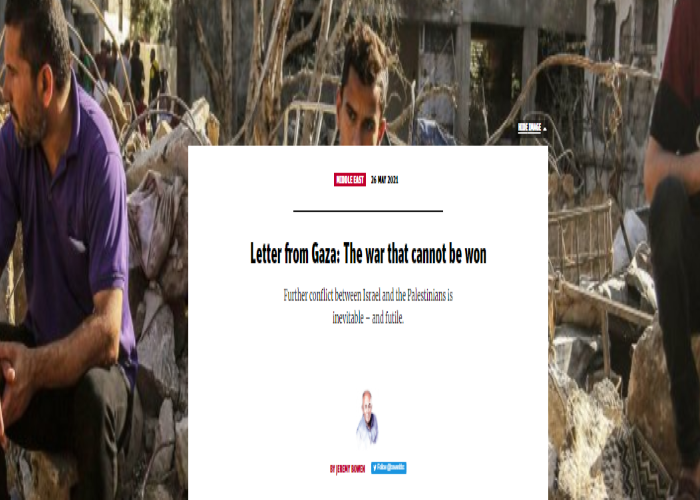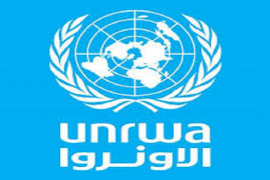Every now and again it is worth reminding ourselves of the opinions and approaches of the man who has been in charge of the BBC’s Middle East content for the past sixteen years.
“Jeremy Bowen was appointed to the newly-created role of Middle East Editor in June 2005.
The new role is designed to enhance our audience’s understanding of the Middle East; and to provide extra commentary, focus and analysis to an increasingly complex area of the world.”
One way to do that is to look at content Jeremy Bowen has produced for other outlets where he is not constrained by BBC editorial standards of accuracy and impartiality. The latest example came on May 26th in an article Bowen wrote for the New Statesman titled “Letter from Gaza: The war that cannot be won”.

Bowen begins that article with an account of the May 10th incident in Beit Hanoun that he had reported inaccurately and partially on BBC television two days earlier. Once again – despite ostensibly presenting ‘both sides’ of the story – Bowen’s graphic descriptions ensure that in the minds of his UK audiences, Israel is to blame for the deaths of Palestinian children.
Bowen also promotes that point by placing his own views in the mouths of interviewees:
“Like every Palestinian I have ever met, Youssef al-Masri believes Israel tells lies to cover up the brutal requirements of its project to strengthen its state at the expense of their hopes.”
He goes on to use an out of context and incomplete quote in order to advance his agenda:
“In a candid moment Ehud Barak, one of Israel’s most illustrious soldiers and a former prime minister, once said, “If I were a Palestinian of the right age, I would join, at some point, one of the terrorist groups.””
Translation of the March 6th 1998 Ha’aretz report on the TV programme during which that remark was made reads:
“The chairman of the Labor Party, MK Ehud Barak, said yesterday that if he had been a Palestinian and at the right age, he might have joined a terrorist organisation. Barak made the remarks on the “Personal Meeting” program that will be broadcast tonight on the cable channel, in response to a question from interviewer Gideon Levy as to what he, who fought terrorism for many years, would have done [had he been born] as a young Palestinian. Barak added that this is an unfair question because the terrorist organisations are acting in an inhumane, serious and degrading manner and are involved in killing civilians, women and children, which should be condemned and acted against.”
Barak later explained that he had been misunderstood and that what he was trying to say was that as a soldier at heart, regardless of where he found himself he would have been among fighters.
Bowen goes on to insert the jaded ‘open-air prison’ trope while carefully avoiding the context of Palestinian terrorism:
“Gaza is a unique and terrible human experiment. Palestinians who live there often say it is the world’s biggest open-air prison. Plenty of people in the rich world, myself included, have had withdrawal symptoms from missing foreign holidays since the beginning of the pandemic. Imagine never being able to leave Gaza, along with two million others, stuck on a narrow stretch of coast around 25 miles long, no more than seven miles wide, and in places much narrower. In recent days I have been working with a Palestinian colleague in Gaza who is 41 years old and a father of three children. He has never travelled out of Gaza. Ever. He’s hoping for parole but so far it has been a life sentence.”
Readers are also provided with Bowen’s view of Hamas:
“I have met most of the senior political leaders of Hamas since the 1990s. Some of them are dead, assassinated by Israel. They ran an organisation that is ruthless, often brutal and always unaccountable. But they are not ranting fanatics. Some kind of engagement to find a permanent truce might, at the very least, have been worth a try. Instead, Israel and its Western allies pursued a policy of isolation. This was a mistake. It deepened the crisis. Four wars between Israel and Hamas, as well as what Israel calls the battles between the wars, show the bankruptcy of what has passed for a strategy.” [emphasis added]
A fanatic is defined as “a person filled with excessive and single-minded zeal, especially for an extreme religious or political cause”. It is hard to place the leaders of an organisation that exists solely in order to wipe a sovereign country off the map in the name of religion into any other category – but Jeremy Bowen does just that.
In order to do so, he of course has to airbrush Hamas leaders’ rants about “treacherous Jews”, “cancer” and “thieves, murderers and criminals”. He has to ignore Hamas calls to “cut off their heads”, “strike their necks”, “rip out their hearts” and “trample the heads of Jews”. He also has to whitewash Hamas’ end game which remains the same regardless of any temporary “truce” that might be in the offing.
It is no coincidence that on Jeremy Bowen’s watch, BBC audiences never see reports about such incitement from Hamas leaders and supporters. It is also no fluke that the BBC has for years whitewashed the basic religious aspect of Hamas’ terror war against Israel, preferring instead to turn it into a story about “occupation”, “blockade” and “an open-air prison”. A story about Iranian backed religious extremists seeking to wipe out the one sovereign country of an ethnic minority is of course much less photogenic for Western audiences and does not contribute to the political narrative adopted by so many members of the media.
That narrative boils down to a long popular theme in British culture: the plucky underdog; the weak battling the strong. And so when those Jeremy Bowen insists are “not ranting fanatics” launch thousands of military grade missiles at Israeli civilians primarily in order to burnish their own political credentials as ‘defenders’ of their faith and its religious symbols, the BBC’s Middle East editor has a typically self-centred spin ready for that too:
“Without question, Israelis suffered too during the recent 11-day war. I was in Ashkelon, in the south, as it suffered repeated red alerts as missiles that had not been stopped by the Iron Dome system came in. It is frightening when the sirens sound and a phone app blinks a message that you have seconds to take cover. But the two experiences, in Gaza and Israel, were not the same. Asymmetric warfare between the strong and the weak guarantees that.”
Asymmetric is the perfect word to describe Bowen’s article with its overwhelming focus on one human side of the story and what few mentions of Israelis there are presented using only the broadest of brushstrokes. Anyone familiar with the products of Bowen’s periodic excursions to the region will not be remotely surprised, but it is that one-sided, terrorism erasing narrative which has dominated BBC coverage for sixteen whole years, despite the fact that it fails to meet the aim of the Middle East editor job description as defined by the BBC: “enhance our audience’s understanding of the Middle East”.
Related Articles:
WHAT DO BBC JOURNALISTS THINK YOU SHOULD BE READING?
BBC’S BOWEN SAW NO HUMAN SHIELDS IN GAZA – BUT REPORTS THEM IN MOSUL
IN WHICH THE BBC’S JEREMY BOWEN REPEATS HIS ‘NO HUMAN SHIELDS IN GAZA’ CLAIMS
BBC’S JEREMY BOWEN REWRITES THE BEIT HANOUN SHORTFALL ROCKET INCIDENT






Bowen has always fought the fight against Israel’s existence – and continues to do so simply by twisting every comment and incident in favour of Palestinians and omitting anything in his reports that favours Israel. He is a disgusting example of a so-called journalist using his position to further his hatred of Jews.